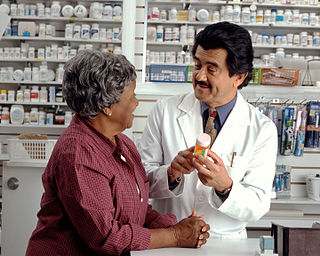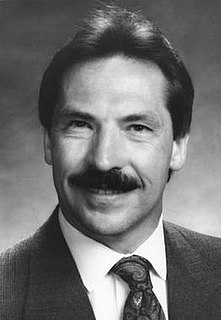
Pharmacists, also known as chemists or druggists, are health professionals who practice in pharmacy, the field of health sciences focusing on safe and effective medication use. Pharmacists undergo university-level education to understand the biochemical mechanisms and actions of drugs, drug uses, therapeutic roles, side effects, potential drug interactions, and monitoring parameters. This is mated to anatomy, physiology, and pathophysiology. Pharmacists interpret and communicate this specialized knowledge to patients, physicians, and other health care providers.
A pharmacy technician is a health care provider who performs pharmacy-related functions, generally working under the direct supervision of a licensed pharmacist. Pharmacy technicians work in a variety of locations, but can also work for long-term care facilities, pharmaceutical manufacturers, third-party insurance companies, computer software companies, or in government or teaching. Job duties include dispensing prescription drugs and other medical devices to patients and instructing on their use. They may also perform administrative duties in pharmaceutical practice, such as reviewing prescription requests with doctor's offices and insurance companies to ensure correct medications are provided and payment is received.

A medical laboratory scientist (MLS), also traditionally referred to as a medical technologist (MT) or clinical laboratory scientist (CLS), is a healthcare professional who performs chemical, hematological, immunologic, histopathological, cytopathological, microscopic, and bacteriological diagnostic analyses on body fluids such as blood, urine, sputum, stool, cerebrospinal fluid (CSF), peritoneal fluid, pericardial fluid, and synovial fluid, as well as other specimens. Medical laboratory scientists work in clinical laboratories at hospitals, reference labs, biotechnology labs and non-clinical industrial labs.
American Society of Health-System Pharmacists is a professional organization that represents pharmacists who serve as patient care providers in acute and ambulatory care settings. The organization’s 45,000 members include pharmacists, student pharmacists, and pharmacy technicians. For more than 75 years, ASHP has been at the forefront of efforts to improve medication use and enhance patient safety.

The American Pharmacists Association, founded in 1852, is the first-established professional society of pharmacists in the United States. The association consists of more than 62,000 practicing pharmacists, pharmaceutical scientists, student pharmacists, pharmacy technicians, and others interested in the profession. Nearly all U.S. pharmacy specialty organizations were originally a section or part of this association.
Clinical pharmacy is the branch of pharmacy in which clinical pharmacists provide direct patient care that optimizes the use of medication and promotes health, wellness, and disease prevention. Clinical pharmacists care for patients in all health care settings but the clinical pharmacy movement initially began inside hospitals and clinics. Clinical pharmacists often work in collaboration with physicians, nurse practitioners, and other healthcare professionals. Clinical pharmacists can enter into a formal collaborative practice agreement with another healthcare provider, generally one or more physicians, that allows pharmacists to prescribe medications and order laboratory tests.
Pharmacy residency is education a pharmacist can pursue beyond the degree required for licensing as a pharmacist.

The Campbell University College of Pharmacy & Health Sciences is an American pharmacy school founded in 1985 by Dean Ronald Maddox and located in Buies Creek, North Carolina. The College is one of seven schools that compose Campbell University. In 2009, the school's name was changed to Campbell University College of Pharmacy and Health Sciences.
The basic requirement for pharmacists to be considered for registration is an undergraduate or postgraduate pharmacy degree from a recognized university. In many countries, this involves a four- or five-year course to attain a master of pharmacy degree (MPharm). In the United States of America, students graduating after January 1, 2003, must complete a doctor of pharmacy degree to become a licensed pharmacist. This same requirement has been coming into place in other countries such as Canada and France.

The UIC College of Pharmacy is a public pharmacy school with two campuses located in Chicago and Rockford, Illinois. It offers a four-year professional degree program that leads to the PharmD, the highest level of professional education in pharmacy, which is approved by the Accreditation Council for Pharmacy Education as the sole entry level degree for the profession. Besides the professional degree, the College also offers programs leading to six master's degrees and four doctorate degrees, covering a spectrum of research areas within the pharmaceutical sciences.
The Pharmacy Guild of Australia is the Pharmacy Owners' representative, but not the Pharmacy Profession body.
Psychiatric pharmacy, also known as mental health pharmacy, is the area of clinical pharmacy specializing in the treatment of people with psychiatric illnesses through the use of psychotropic medications. It is a branch of neuropsychiatric pharmacy, which includes neurologic pharmacy.

The College of Psychiatric and Neurologic Pharmacists (CPNP) is a professional organization representing pharmacists and other healthcare professionals in the specialty areas of psychiatric and neurologic pharmacy practice within the United States. It is the only such organization representing the interests of neuropsychiatric pharmacists in the United States. In an effort to help connect patients with psychiatric pharmacists, CPNP maintains "The Mental Health Pharmacy Directory," an online search engine that includes more than 850 mental health pharmacies. As of December 2015, CPNP is a member of the Coalition on Psychiatric Emergencies (COPE) and is the only professional pharmacy organization represented on the coalition. In January 2017, CPNP was elected to membership status on the Joint Commission of Pharmacy Practitioners (JCPP). CPNP is the only Board of Pharmacy Specialties accredited provider of BCPP recertification products.

A collaborative practice agreement (CPA) is a legal document in the United States that establishes a legal relationship between clinical pharmacists and collaborating physicians that allows for pharmacists to participate in collaborative drug therapy management (CDTM).

The Joint Commission of Pharmacy Practitioners (JCPP) is the largest professional delegation representing the interests of pharmacists within the United States. JCPP represents 13 professional associations in the field of pharmacy, developing consensus policy directives for the profession. It is well known for the 2014 development of "The Pharmacists’ Patient Care Process," which provides broad, consensus guidelines for how clinical pharmacists should practice.











